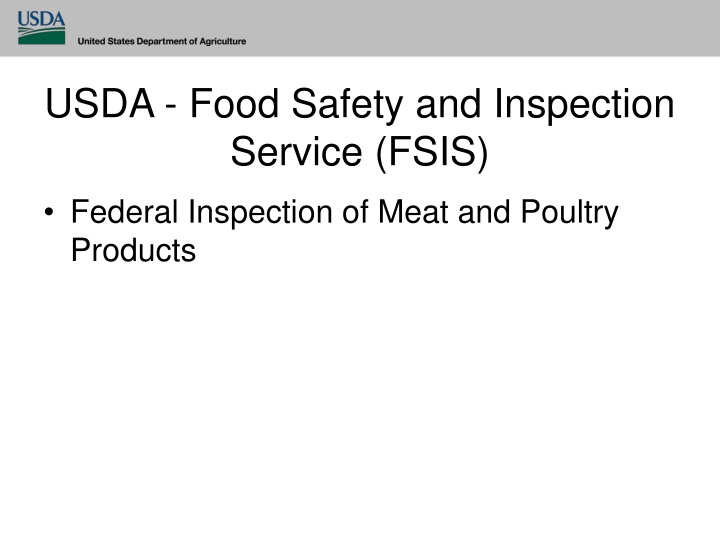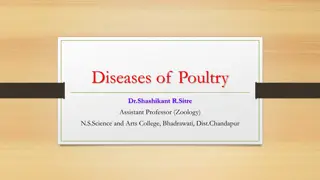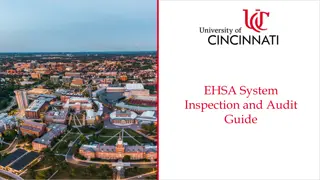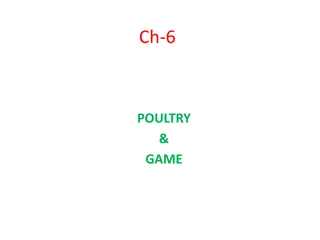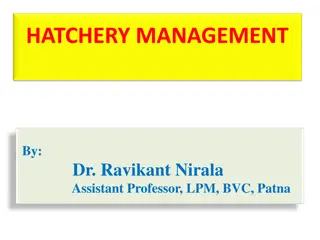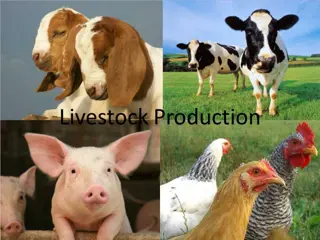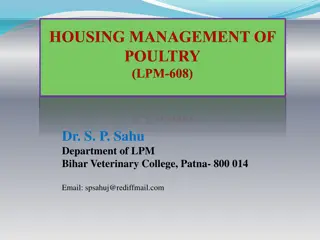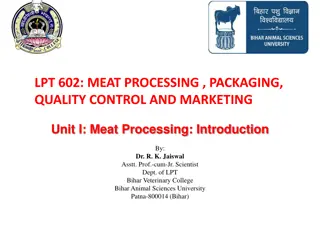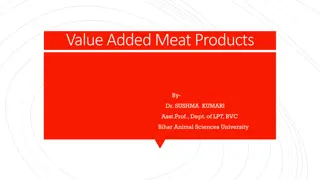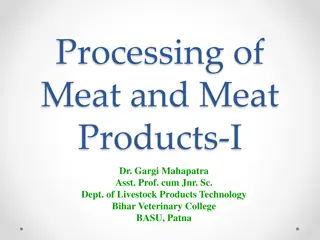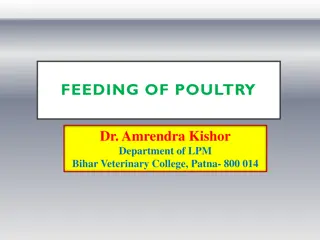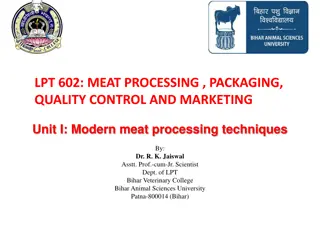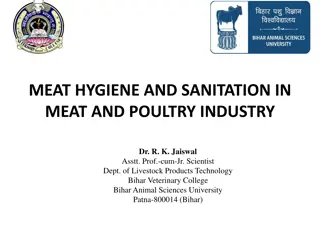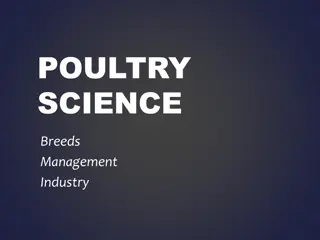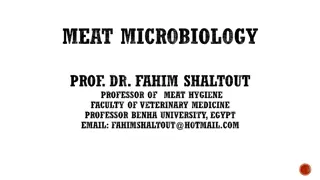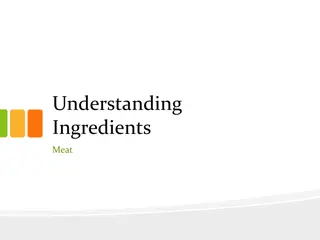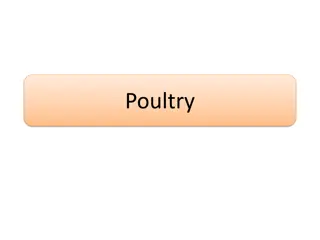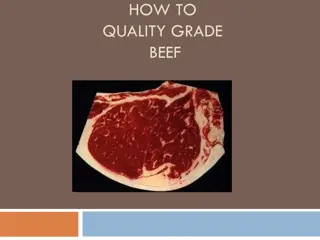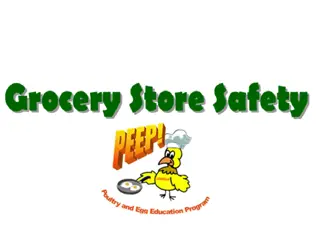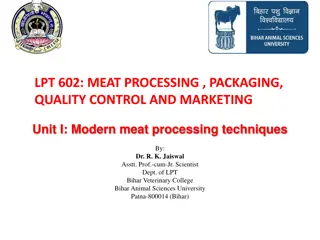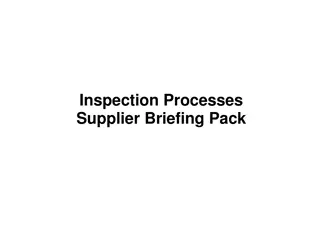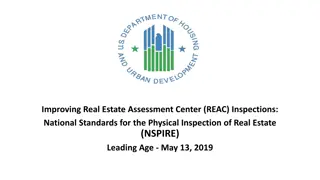United States Food Safety and Inspection Service: Ensuring Meat and Poultry Products' Safety
The United States Department of Agriculture's Food Safety and Inspection Service (FSIS) oversees the federal inspection of meat and poultry products to ensure their safety for human consumption. The statutes governing this process include the Federal Meat Inspection Act, the Poultry Products Inspection Act, the Egg Products Inspection Act, and the Humane Methods of Slaughter Act. The Acts cover all meat and poultry products unless exempted, with specific criteria for what constitutes a meat or poultry food product. Certain products are exempt based on consumer perception, and relatively small portions are also subject to different criteria. Overall, the FSIS plays a crucial role in safeguarding the quality and safety of meat and poultry products in the United States.
Download Presentation

Please find below an Image/Link to download the presentation.
The content on the website is provided AS IS for your information and personal use only. It may not be sold, licensed, or shared on other websites without obtaining consent from the author.If you encounter any issues during the download, it is possible that the publisher has removed the file from their server.
You are allowed to download the files provided on this website for personal or commercial use, subject to the condition that they are used lawfully. All files are the property of their respective owners.
The content on the website is provided AS IS for your information and personal use only. It may not be sold, licensed, or shared on other websites without obtaining consent from the author.
E N D
Presentation Transcript
USDA - Food Safety and Inspection Service (FSIS) Federal Inspection of Meat and Poultry Products
Statutes Federal Meat Inspection Act Includes Siluriformes (Catfish) Poultry Products Inspection Act Egg Products Inspection Act Humane Methods of Slaughter Act
Amenability All meat and poultry products capable of use as human food are amenable to the Acts unless an exemption from the definition of a meat food product exists. Not all production of meat and poultry products amenable to the Acts require federal inspection.
Meat Food Product (9 CFR 301.2): Any article capable of use as human food which is made wholly or in part from any meat or other portion of the carcass of any cattle, sheep, swine, or goats, except those exempted from definition as a meat food product Products with relatively small quantities of meat and not represented as a meat product or not considered by consumers to be a product of the meat industry are exempted from the definition.
Relatively Small Portions 3% or less raw meat Less than 2% cooked meat 30% or less fat, tallow, or meat extract alone or in combination
Examples of Products Exempt Based on Consumer Perception Pork and Beans Closed-face sandwiches Pepperoni rolls
Poultry Food Product (9 CFR 381.1): This term means any product capable of use as human food which is made in part from any poultry carcass or part thereof, excepting those exempted from definition
Relatively Small Portions Less than 2% cooked poultry meat Less than 10 percent cooked poultry skins, giblets or fat, separately Less than 10 percent cooked poultry skins, giblets, fat and poultry meat (limited to less than 2 percent) in any combination
Jurisdiction within USDA-FSIS Office of Field Operations (OFO) Office of Investigation, Enforcement, and Audit (OIEA)
OFO Responsible for managing and administering the nation s meat, poultry and egg products inspection and verification program.
OIEA Conducts surveillance and investigation of regulated and in-commerce meat, poultry and egg products facilities and other activities.
What is a Grant of Inspection? A Grant of Inspection is approval from USDA- FSIS to an individual, firm, or company to produce meat, poultry, or egg products in compliance with regulatory requirements and under the supervision of inspection program personnel.
Why Apply for a Grant of Inspection? The sale of any meat must be derived from carcasses slaughtered under inspection. The sale of inspected and passed meat and poultry products produced under federal inspection can be sold to any domestic customer within the scope of the FMIA and PPIA. The sale of products produced outside of federal inspection is limited to those produced under state inspection programs or limited exemptions.
How to Apply for a Grant of Inspection? Submit FSIS Form 5200-2 along with all HACCP plans, Sanitation Standard Operating Procedures (SSOP), and written recall procedures to the Philadelphia District Office. Philadelphia District Office Grant Curator: (215) 430-6236
How to Apply for a Grant of Inspection? (cont.) FSIS will review all submitted documents for compliance before a walkthrough of the proposed establishment can be conducted by the Frontline Supervisor (FLS). This may entail several back-and-forth correspondences until compliance is achieved. Once a walkthrough is completed and found acceptable by the FLS, the FLS submits a recommendation to the Philadelphia District Office to issue a conditional Grant of Inspection. Upon starting operations under inspection, you will have ninety (90) days to validate your HACCP programs in order to obtain a permanent Grant of Inspection.
Sanitation Performance Standards Sanitation performance standards (SPS) set the results to be achieved in order to operate under sanitary conditions, but they do not prescribe the step-by-step procedures to produce safe meat and poultry products. Simply put, the expected result is defined in the regulation, but the methods to achieve that result are not specified. The performance standards allow establishments the flexibility to develop and employ innovative and unique sanitation procedures to achieve the desired results.
SSOPs Sanitation Standard Operating Procedures (SSOPs) are written procedures that an establishment develops and implements to prevent direct contamination or adulteration of product. Establishments are required to maintain these written procedures on file, and they must be available to FSIS upon request. It is the establishment s responsibility to implement the procedures as written in the SSOPs. Establishments must maintain daily records sufficient to document the implementation and monitoring of the SSOPs and any corrective action taken.
HACCP Hazard Analysis and Critical Control Point (HACCP) system provides a framework for establishments to conduct science-based process controls that can be validated as effective in eliminating, preventing, or reducing to an acceptable level the food safety hazards that are reasonably likely to occur in an official establishment s particular production processes. Examples of some HACCP programs can be found <here>. The generic models are not intended to be used as is . FSIS recommends that establishments tailor the model(s) to fit the establishment s operation.
Who Carries Out the Inspection Program by OFO Food Inspectors (FI) conduct carcass-by-carcass inspections. Consumer Safety Inspectors (CSI) and Supervisory CSIs (SCSI) conduct verifications of sanitary conditions and food safety programs at establishments. Public Health Veterinarians (PHV) conduct dispositions of carcasses retained by FIs due to pathology conditions. Frontline Supervisors (FLS)supervise inspection program personnel within circuits (assigned geographic areas). Enforcement, Investigations, and Analysis Officers (EIAO) conduct Food Safety Assessments (FSAs) at establishments and conduct outreach.
How the Inspection Program is Carried Out All livestock and a portion of poultry undergo antemortem inspection. All slaughtered carcasses undergo postmortem inspection. Daily inspection by CSIs is carried out to verify food safety programs, sanitary conditions, and economic requirements. FSAs are usually conducted around the time an establishment receives a permanent grant of inspection, following a recall, or for other reasons but are typically infrequent for an individual establishment.
FSIS Establishments in CT, MA, and RI There are currently 185 federally inspected establishments in these states.
Additional Resources Apply for Grant of Inspection | Food Safety and Inspection Service (usda.gov) (https://www.fsis.usda.gov/inspection/apply- grant-inspection) Small & Very Small Plant Guidance | Food Safety and Inspection Service (usda.gov) (https://www.fsis.usda.gov/inspection/compliance -guidance/small-very-small-plant-guidance) Philadelphia District EIAO Outreach Team Email: SPOutreachPDO@usda.gov
